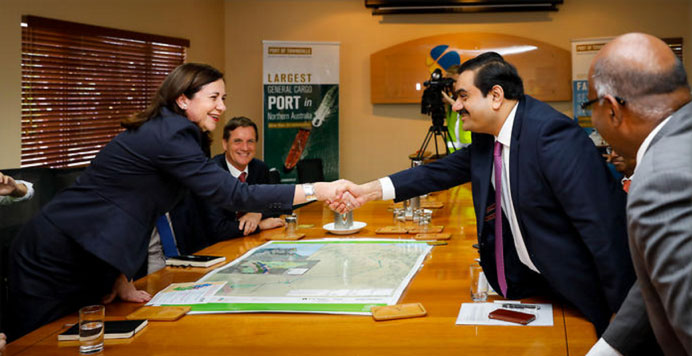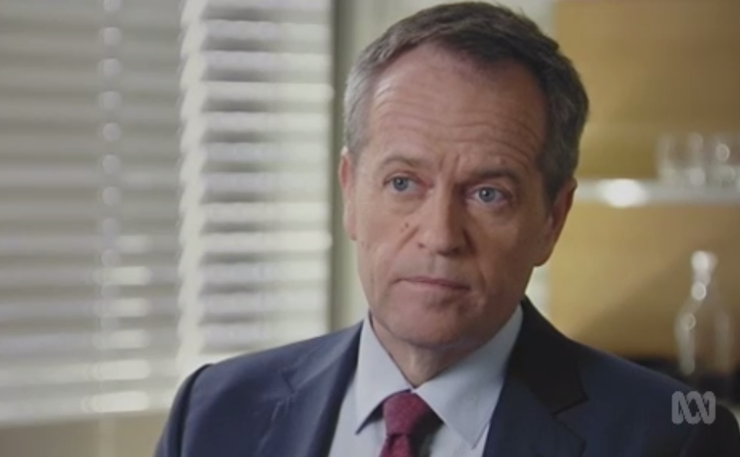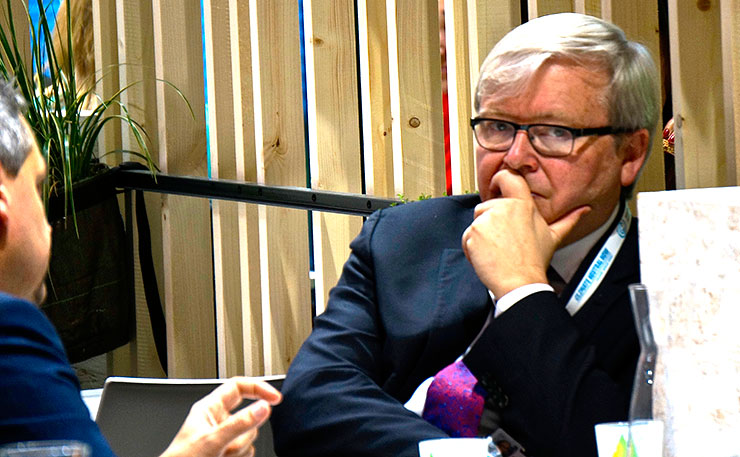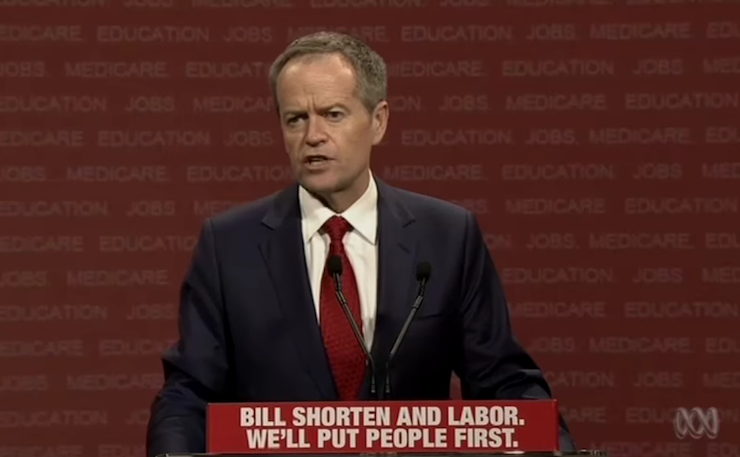Labor is trying to have a policy on shutting down coal and tackling climate change, without having a policy on shutting down coal or tackling climate change, writes Ben Eltham.
The politics of carbon has never been kind to Labor, but the ALP is suddenly in the most climate trouble it has been since losing office.
The problem, as it has been for some time now, is the plans for an enormous mine at Carmichael in central Queensland proposed by Adani. Carmichael is an incipient climate disaster. Burning coal releases pollution that warms the oceans and atmosphere. As the Arctic melts and the Great Barrier Reef bleaches, there can be no safe future for coal.
Do Bill Shorten and Labor support the Carmichael mine, or not?
Labor says it opposes the mine. But it won’t cancel the mine. Bill Shorten says the mine “doesn’t stack up”. But he also says “Labor doesn’t rip up contracts”.
So what exactly is Labor’s policy? It’s a good question. Few policy positions are as disorienting as Labor’s position on coal.
On the one hand, Labor wants to protect high-paying jobs in the mining sector. On the other hand, the ALP knows that coal’s days are numbered, and that eventually the economy must decarbonise. The challenge is how to do this while protecting displaced workers and vulnerable industries.

In recent times, Labor and many in the environment movement have tried to square the circle with the slogan of “just transition”. Defined by climate activist and trade unionist Annabella Rosemberg as “a strategy aimed at protecting those whose jobs, income, and livelihoods are at risk as a consequence of climate policies”, trade unions and the ALP have embraced the idea in an attempt to protect carbon-intensive jobs while moving towards a greener future.
But making change fair is never easy, as Labor found out in the Rudd-Gillard years.
There will be losers in any transition as wrenching as decarbonisation, and slogans about justice mean little to workers who have lost their jobs. At some point, the principles of justice and transition will conflict. Justice for whom? What sort of transition?
The problem is particularly acute for the ALP, which tries to walk both sides of the divide. Labor wants to speak for resource workers in Queensland, even as it campaigns on its climate credentials to environmentalists in inner Melbourne. By doing so, it risks enraging both.
A glance at some of Bill Shorten’s recent media conferences shows the difficulty of the high wire act.
In recent weeks, Shorten has issued a string of statements about the Carmichael mine, none of which add up to a proper policy. As he has argued repeatedly, the Opposition Leader doesn’t think the project “stacks up”. His current position seems to be that he doesn’t have a position: Labor will decide what to do if it wins the next election.

The confusion was obvious in a doorstop in Perth on Monday. Shorten said twice that “I don’t support the Adani project”. He then went on to say that “when contracts are entered in to by previous governments, we can’t just simply rip them up because that would then create investment uncertainty”.
In other words, Shorten opposes the Carmichael project, but won’t cancel it if Labor wins government. Apparently, avoiding “investment uncertainty” is more important than avoiding climate change.
The new position – if it is a position – makes very little sense. If Shorten doesn’t think the mine stacks up, why let it continue? If he is so worried about investors, why is he opposing the Coalition’s company tax cuts, which have much wider implications for business investment?
Moreover, there is no contract to rip up. Adani has not signed contracts with the federal government; instead, it has secured a series of environmental approvals. Approvals can be revoked, and there is even a clause that expressly allows it in the Environmental Protection and Biodiversity Conservation Act.
Section 145: Revocation of approval
(1) The Minister may, by written instrument, revoke an approval under this Part for the purposes of a specified provision of Part 3 if:
(a) a significant impact on the matter protected by the provision has occurred because of the contravention of a condition attached to the approval; or
(b) the conditions specified in subsection (2) are satisfied.
(2) The conditions are that:
(a) the action has had, or the Minister believes that the action will have, a significant impact that was not identified in assessing the action on a matter protected by a provision of Part 3 for which the approval has effect; and
(b) the approval would not have been granted if information that the Minister has about that impact had been available when the decision to approve the action was made.
The EPBC Act states that the Environment Minister can revoke an approval if new information comes to light. Since Carmichael was approved, the Great Barrier Reef has suffered devastating bleaching, the US south-east experienced the most expensive hurricane season ever, and Arctic sea ice has fallen to its lowest level of the recorded era. The Australian Conservation Foundation has obtained legal advice that suggests the mine could indeed be revoked.
Whatever the legalities, the true test is political. A Labor federal government could certainly find ways to stop a major project if it really wanted to: by revoking approval, by imposing a special levy, or at last resort, by passing a new law to rule it out.
Nor are the arguments about sovereign risk convincing. Mining companies scour the globe for resources, operating everywhere from dictatorships in Africa to one-party autocracies in Hungary, Turkey and Russia. Killing off a single mine in stable, democratic Australia will scarcely deter global investment.
But Labor’s problems on Adani highlight a larger question: whether Labor is truly committed to the environment, or whether jobs in dirty industries matter more. While Labor has focused on the justice, many environmentalists question the ALP’s commitment to transition.
For reasons of history and philosophy, Labor remains deeply wedded to fossil fuels. The ALP rightly cares about working class jobs in minerals and resources. Mining remains a unionised industry and the CFMEU one of the nation’s last remaining strong unions. For factional reasons, Shorten also can’t afford to alienate the CFMEU just now. With his support base in Victoria suddenly undermined by the implosion of the so-called “stability pact”, Victorian Labor is in the midst of a dangerous internal realignment.
The Batman by-election has complicated Labor’s internal battles. At times, it has suited Labor to attack the Greens as inner city snobs who care little for the struggles of Queensland workers. This is a good attack line, until you realise that there are more north Queenslanders working in industries tied to the Great Barrier Reef than there are working in the resources sector. There are 69,000 jobs tied to the reef, but only 55,000 jobs in all of Queensland in the mining sector.

Labor has been unable to articulate why jobs in reef tourism are somehow less important than jobs in an unbuilt coal mine. Are the scuba diving instructors and resort cleaners somehow less working class than the blokes in high-vis? For some in the ALP and the labour movement, the answer is yes.
Labor’s confusion on carbon policy also reflects the trauma the party suffered between 2007 and 2013. The ALP entered government in 2007 with grand plans to tackle the “great moral challenge” of a warming planet. Six years and two changes of prime minister later, the party went to the 2013 election running on a platform of abolishing the very carbon tax that they spent so much political capital implementing.
The ALP’s desire to forget the dark days of the Rudd-Gillard years is behind the party’s enthusiastic attack on the Greens for voting against the Carbon Pollution Reduction Scheme way back in 2009.
Why would the Labor Party want to remind voters of a crushing defeat? In order to attack the Greens, it appears, who many Labor parliamentarians and members regard as irresponsible and unrealistic.
CPRS passes, Rudd doesn’t delay policy, doesn’t suffer massive drop in personal approval. Labor wins 2010 election and ETS is in operation for 3 years. Lived experience undermines Abbott’s scare campaign in 2013 election.
— Pat Conroy MP (@PatConroy1) November 24, 2017
It’s worth spending some time on the fiery debate between the Greens and Labor about the first emissions trading scheme, because it tells us some important things about Labor’s approach to environment policy.
Labor is still very angry at the Greens for voting down the first emissions trading scheme. It’s an anger born of guilt, as is often the way.
The CPRS was voted down in the Senate twice, first in August and then in December 2009. Australia has had three general elections and four prime ministers since then. Australia also enjoyed two years of a perfectly workable carbon tax, between 2012-14 – a carbon tax Labor negotiated with the Greens and independents. To blame the Greens for the absence of a proper climate policy now is distinctly illogical: after all, if the Greens were at fault for killing the CPRS, then on this analysis they must equally be the heroes for passing the Clean Energy Future bill.
A much simpler explanation is at hand. The real reasons for the downfall of the CPRS were the weakness of the policy, and the failure of Labor’s tactics.
Despite Labor’s protestations, the CPRS was a weak policy. It committed to just a 5 per cent emissions reduction, with a clause to increase it if international action firmed. It contained oodles of handouts for big polluters, including 94 per cent free permits for exporters and cash handouts for coal generators. And it retained few incentives for renewable energy. As I wrote in 2008, the CPRS pleased almost no-one: neither the Coalition, nor the Greens, nor the fossil fuel sector, nor environmentalists. It was completely predictable that the CPRS would not pass the Senate.
As the late Phillip Chubb makes clear is his book Power Failure – the best and most detailed study of the carbon debate in the Rudd-Gillard years – the bulk of the blame must accrue to Labor and Rudd.
Lacking the numbers in the Senate, Rudd decided to use carbon as a wedge to try and split the Liberal Party. The strategy backfired spectacularly. While Malcolm Turnbull’s leadership was destroyed, the result was that the Liberal Party united behind Tony Abbott on a policy of relentless climate denialism.

Rudd ignored the Greens and minor parties, and put all his eggs in the bipartisanship basket. Once Abbott came to the Liberal leadership, Rudd had no plan B. He could have negotiated with the Greens on CPRS amendments – but he didn’t. By the time of the second vote in late 2009, the CPRS was opposed by every major environment group, as well as by Ross Garnaut and many policy experts.
After the CPRS went down, and smarting from the disastrous Copenhagen climate conference, Rudd shelved his “great moral challenge” and embarked on a chaotic attempt to reform federal health funding. Meanwhile, Wayne Swan introduced the fateful tax on mining companies. In a matter of months, Rudd’s prime ministership disintegrated.
While the Greens must bear some responsibility for walking away from the first CPRS, they can hardly be blamed for the implosion of Rudd’s leadership. Nor can they be blamed for subsequent policy developments – for these, Tony Abbott was the driving factor.
The squabbles over the dead CPRS and the live Carmichael mine also show why Labor has so much difficulty with climate policy. Just as in 2009, it wants to position itself between the Coalition and the Greens. Just as in 2009, it’s winning few plaudits for the triangulation.
Labor needs to make some hard choices on carbon. Bill Shorten, like Australia itself, no longer has the luxury of an each-way bet.
If Labor wants a just transition, it needs to transition. If you can’t cancel a coal mine that hasn’t been built yet, you are not transitioning. If the ALP want a safe climate, it needs to put in place policies to shut down coal.
Donate To New Matilda
New Matilda is a small, independent media outlet. We survive through reader contributions, and never losing a lawsuit. If you got something from this article, giving something back helps us to continue speaking truth to power. Every little bit counts.




